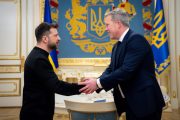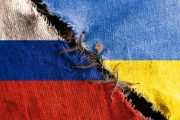
Russian President Vladimir Putin has declared that he will seek reelection. Should he emerge victorious — and no one seriously doubts that he will — it will be his fifth term as head of state.
Putin made his revelations at a ceremony where he awarded “Hero of Russia” medals to servicemen who had participated in the military operation against Ukraine.
Hero of the Donetsk People’s Republic Artyom Zhoga, who was recently named speaker of the Russian federal subject’s parliament, questioned the Russian leader if he would run in 2024, and the latter said yes.
The footage from the ceremony shows Zhoga shaking hands with Putin and telling him that the entire Donbass would like him to participate in the election. “Thanks to your actions…. We became free, we got the opportunity to choose…. You are our president… We are your team, we need you, Russia needs you,” he said.
Thanking him for the praise, Putin acknowledged that while he had “different thoughts at different times” on the subject, the time had come to make a final decision. “I am going to run for President of the Russian Federation,” he said.
Zhoga is the commander of the republic’s famous Sparta Battalion, which has been defending the DPR against Kiev’s forces since 2014. He took over the military post from his son Vladimir, who died at the age of 28 in 2022 while offering cover for the evacuation of civilians near the town of Volnovakha. For his deeds, he was posthumously awarded the title “Hero of Russia.”
Based on a Public Opinion Foundation (FOM) poll released on Thursday, about 70 percent of Russian citizens believe that Putin should run for another term in office, with another 15 percent saying that the incumbent should leave his present post but take a senior government position. Only eight percent believe that the Russian leader should leave the political stage altogether.
Putin’s likely rivals — for what many in the West will no doubt claim is a staged election — include Gennady Zyuganov, the long-time leader of the Russian Communist Party, who announced his bid in late November but noted that the final decision would be made by his party’s Central Committee. Other Russian parties, including the Liberal Democratic Party (LDPR) and New People, have also indicated that they intend to introduce their own candidates.
Putin’s proclamation that he will run for office again next year was a “logical” move in the wake of the current global situation, former Russian leader Dmitry Medvedev said on December 8.
In a statement provided to the media by his assistant, former president Medvedev stated that considering global circumstances and the “dramatic period” Russia was going through, Putin’s decision was “absolutely logical and correct.”
“His work as president must be continued,” Medvedev, who currently serves as deputy chairman of Russia’s Security Council, was quoted as saying.
The 2024 presidential election will be held over a three-day period from March 15-17, Russia’s Central Election Commission (CEC) declared. The winner will be inaugurated in early May.
Next year’s election will be the first time a presidential election is conducted over multiple days. Nonetheless, other Russian elections have used the multi-day format following its introduction during the Covid-19 outbreak.
The extended format has proven to be popular among voters, permitting better turnout and putting less pressure on local election committees, CEC head Ella Pamfilova explained, elaborating that keeping the polls open for several days has become a “tradition” in the country.
In 2000, Putin was elected Russia’s president, serving two four-year terms until 2008. Although presidential terms in the country were technically unrestricted at the time, an individual could only serve two consecutive terms.
Later, Putin became prime minister under Dmitry Medvedev, who was Russia’s president between 2008 and 2012. During Medvedev’s tenure, the presidential term was extended to six years.
Putin has remained Russia’s president since 2012 and is presently serving his second six-year term after being reelected in 2018.
A key constitutional reform undertaken in 2020 overhauled the Russian presidency. The new rules abolished the provision permitting two consecutive terms for one person and introduced a hard cap of two six-year terms in total instead.
Nevertheless, according to an amendment tabled by renowned cosmonaut-turned-MP Valentina Tereshkova, Putin’s terms before the constitutional makeover were “nullified,” effectively allowing him to run for office in 2024 — and in 2030 — if he wishes to.
Various public figures and politicians have already announced their plans to contest Putin’s presidential bid next year. Independent candidates must garner at least 300,000 signatures from their backers to file a bid, while those nominated by registered parties must amass at least 100,000. Candidates nominated by parties represented in the country’s parliament do not have to abide by the signature-gathering requirement.
Thus far, the list of presidential hopefuls includes various liberal figures, namely Ekaterina Duntsova, a journalist and former local MP from Rzhev; long-time opposition figure Boris Nadezhdin, a former MP and now a regional legislator supported by the centrist-right party Civic Initiative; as well as Sergey Lipatov, a lawyer and activist. All three of these hopefuls have been critical of the policies of the Russian government, including Moscow’s military operation in Ukraine.
Igor Girkin (also known as Igor Strelkov), a previous field commander who briefly served as the defense minister in the Donetsk People’s Republic early in the conflict in then-Ukrainian Donbass, has also declared his intention to run. Girkin, a contentious figure who has been highly critical of the military operation in Ukraine — although mainly about its execution instead of its raison d’etre — was detained earlier this year on charges of making public calls to participate in activities regarded as extremist by the Russian government. Whether he will qualify to run for president remains to be seen.
Anatoly Rabinovich, a less-well-known politician and public advocate, has also revealed his intent to run for the presidency, hinting that his bid would become a “test of tolerance” for Russians. While he voiced confidence that Putin would win the election, he stated that should a candidate in his 40s garner some 20 percent, it would be a major win for the country’s opposition. However, this would only be possible if the opposition manages to field a single candidate, he cautioned.




